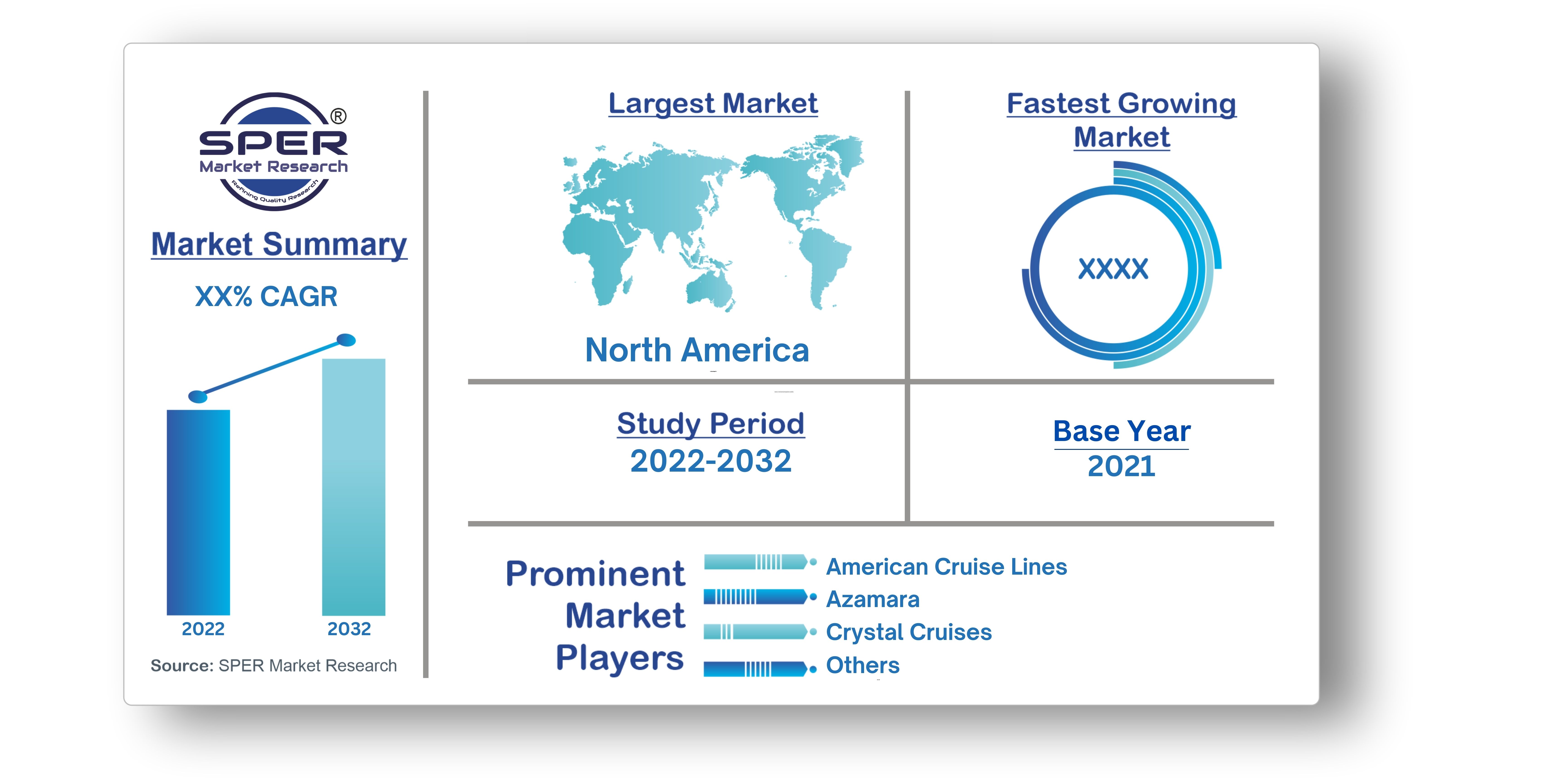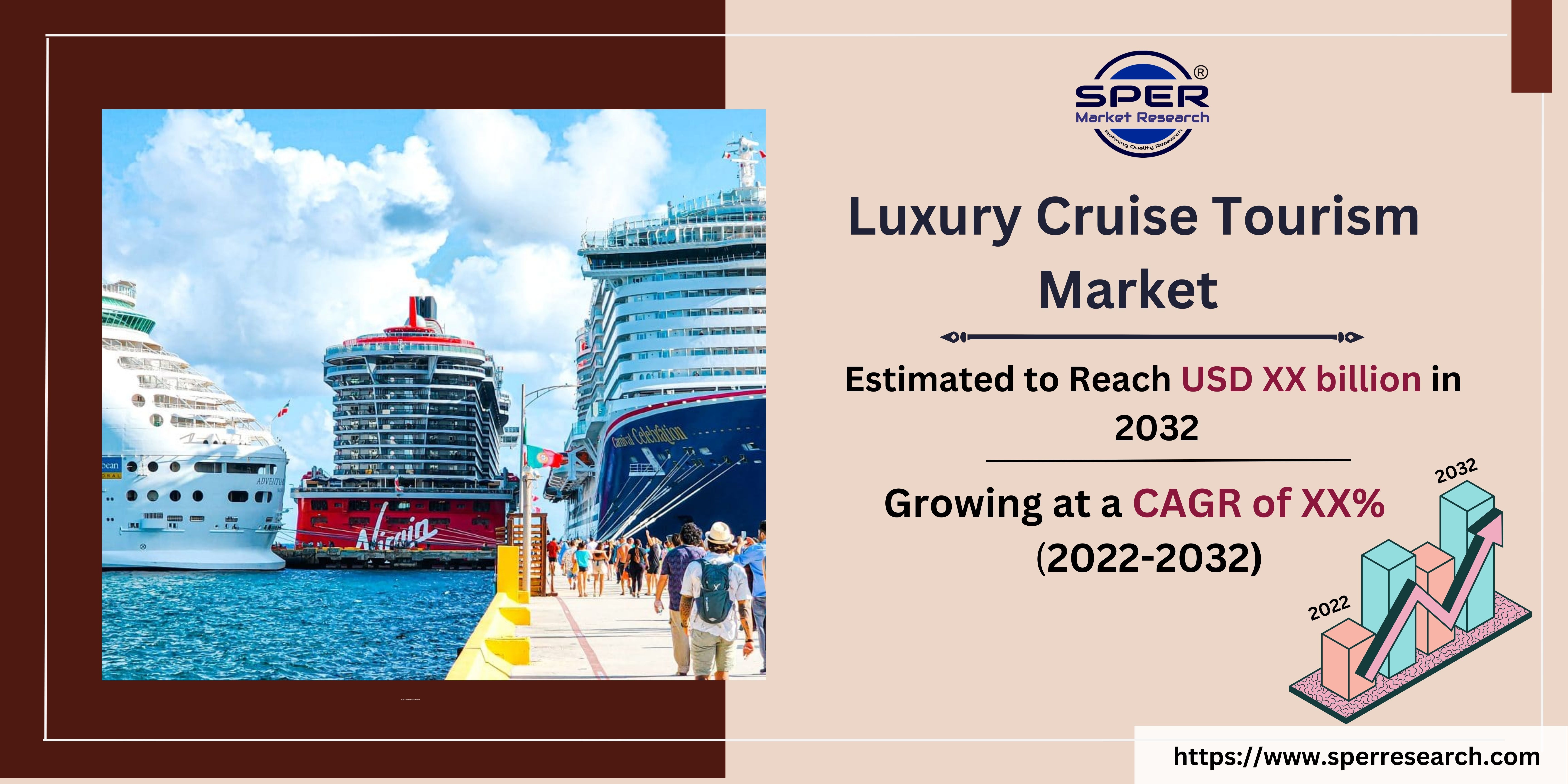
Luxury Cruise Tourism Market Growth, Size, Trends, Share, Revenue, Challenges and Future Outlook
Luxury Cruise Tourism Market Size- By Cruise Lines, By Cruising Type, By Services, By Booking Mode- Regional Outlook, Competitive Strategies and Segment Forecast to 2032
| Published: Apr-2023 | Report ID: TRAT2305 | Pages: 1 - 244 | Formats*: |
| Category : Travel & Tourism | |||


| Report Metric | Details |
| Market size available for years | 2019-2032 |
| Base year considered | 2021 |
| Forecast period | 2022-2032 |
| Segments covered | By Cruise Lines, By Cruising Type, By Services, By Booking Mode |
| Regions covered | Asia-Pacific, Europe, Middle East and Africa, North America, Latin America |
| Companies Covered | American Cruise Lines, Azamara, Crystal Cruises, Norwegian Cruise Line Holdings Ltd., Oceania Cruises S. de R.L., Regent Seven Seas Cruises, Royal Caribbean International, Seabourn, Silversea Cruises, Viking Ocean Cruises |
- Adventure and Exploration Cruise Lines
- Contemporary/Upscale Cruise Lines
- Mainstream Cruise Lines
- Premium Cruise Lines
- Theme Cruise Lines
- Traditional Cruise Lines
- Luxury Yachts
- Ocean Cruises
- River Cruises
- Small-ship Cruises
- 4D Movie Theatres
- Adventurous Sports
- Bars & Pubs
- Cruise Fares
- In-suite Spa Treatment Centres
- Planetarium
- Restaurants
- Snow Rooms
- Water Sports
- Offline
- Online
- Asia-Pacific
- Europe
- Middle East & Africa
- North America
- Latin America
- Size of Global Luxury Cruise Tourism Market (FY’2019-FY’2032)
- Overview of Global Luxury Cruise Tourism Market
- Segmentation of Global Luxury Cruise Tourism Market By Cruise Lines (Adventure and Exploration Cruise Lines, Contemporary/Upscale Cruise Lines, Mainstream Cruise Lines, Premium Cruise Lines, Theme Cruise Lines, Traditional Cruise Lines, Others)
- Segmentation of Global Luxury Cruise Tourism Market By Cruising Type (Luxury Yachts, Ocean Cruises, River Cruises, Small-ship Cruises, Others)
- Segmentation of Global Luxury Cruise Tourism Market By Services (4D Movie Theatres, Adventurous Sports, Bars & Pubs, Cruise Fares, In-suite Spa Treatment Centres, Planetarium, Restaurants, Snow Rooms, Water Sports, Others)
- Segmentation of Global Luxury Cruise Tourism Market By Booking Mode (Offline, Online)
- Statistical Snap of Global Luxury Cruise Tourism Market
- Global Luxury Cruise Tourism Market Growth Analysis
- Problems and Challenges in Global Luxury Cruise Tourism Market
- Global Luxury Cruise Tourism Market Competitive Landscape
- Impact of COVID-19 and Demonetization on Global Luxury Cruise Tourism Market
- Details on Recent Investment in Global Luxury Cruise Tourism Market
- Competitive Analysis of Global Luxury Cruise Tourism Market
- Major Players in the Global Luxury Cruise Tourism Market
- SWOT Analysis of Global Luxury Cruise Tourism Market
- Global Luxury Cruise Tourism Market Future Outlook and Projections (FY’2019-FY’2032)
- Recommendations from Analyst
1.1. Scope of the report1.2. Market segment analysis
2.1 Research data source2.1.1 Secondary data2.1.2 Primary data2.1.3 SPER’s internal database2.1.4 Premium insight from KOL’s2.2 Market size estimation2.2.1 Top-down and Bottom-up approach2.3 Data triangulation
4.1. Driver, Restraint, Opportunity and Challenges analysis4.1.1 Drivers4.1.2 Restraints4.1.3 Opportunities4.1.4 Challenges4.2. COVID-19 Impacts of the Global Luxury Cruise Tourism Market
5.1. SWOT analysis5.1.1 Strengths5.1.2 Weaknesses5.1.3 Opportunities5.1.4 Threats5.2. PESTEL analysis5.2.1 Political landscape5.2.2 Economic landscape5.2.3 Social landscape5.2.4 Technological landscape5.2.5 Environmental landscape5.2.6 Legal landscape5.3. PORTER’S five forces analysis5.3.1 Bargaining power of suppliers5.3.2 Bargaining power of Buyers5.3.3 Threat of Substitute5.3.4 Threat of new entrant5.3.5 Competitive rivalry5.4. Heat map analysis
6.1 Global Luxury Cruise Tourism Manufacturing Base Distribution, Sales Area, Product Type6.2 Mergers & Acquisitions, Partnerships, Product Launch, and Collaboration in Global Luxury Cruise Tourism Market
7.1 Adventure and Exploration Cruise Lines7.2 Contemporary/Upscale Cruise Lines7.3 Mainstream Cruise Lines7.4 Premium Cruise Lines7.5 Theme Cruise Lines7.6 Traditional Cruise Lines7.7 Others
8.1 Luxury Yachts8.2 Ocean Cruises8.3 River Cruises8.4 Small-ship Cruises8.5 Others
9.1 4D Movie Theatres9.2 Adventurous Sports9.3 Bars & Pubs9.4 Cruise Fares9.5 In-suite Spa Treatment Centres9.6 Planetarium9.7 Restaurants9.8 Snow Rooms9.9 Water Sports9.10 Others
10.1 Offline10.2 Online
11.1 Global Luxury Cruise Tourism Market and Market Share by Region (2019-2025)11.2 Global Luxury Cruise Tourism Market and Market Share by Region (2026-2032)11.3 Asia-Pacific11.3.1 Australia11.3.2 China11.3.3 India11.3.4 Japan11.3.5 South Korea11.3.6 Rest of Asia-Pacific11.4 Europe11.4.1 France11.4.2 Germany11.4.3 Italy11.4.4 Spain11.4.5 United Kingdom11.4.6 Rest of Europe11.5 Middle East and Africa11.5.1 Kingdom of Saudi Arabia11.5.2 United Arab Emirates11.5.3 Rest of Middle East & Africa11.6 North America11.6.1 Canada11.6.2 Mexico11.6.3 United States11.7 Latin America11.7.1 Argentina11.7.2 Brazil11.7.3 Rest of Latin America
12.1 American Cruise Lines12.1.1 Company details12.1.2 Financial outlook12.1.3 Product summary12.1.4 Recent developments12.2 Azamara12.2.1 Company details12.2.2 Financial outlook12.2.3 Product summary12.2.4 Recent developments12.3 Crystal Cruises12.3.1 Company details12.3.2 Financial outlook12.3.3 Product summary12.3.4 Recent developments12.4 Norwegian Cruise Line Holdings Ltd.12.4.1 Company details12.4.2 Financial outlook12.4.3 Product summary12.4.4 Recent developments12.5 Oceania Cruises S. de R.L.12.5.1 Company details12.5.2 Financial outlook12.5.3 Product summary12.5.4 Recent developments12.6 Regent Seven Seas Cruises12.6.1 Company details12.6.2 Financial outlook12.6.3 Product summary12.6.4 Recent developments12.7 Royal Caribbean International12.7.1 Company details12.7.2 Financial outlook12.7.3 Product summary12.7.4 Recent developments12.8 Seabourn12.8.1 Company details12.8.2 Financial outlook12.8.3 Product summary12.8.4 Recent developments12.9 Silversea Cruises12.9.1 Company details12.9.2 Financial outlook12.9.3 Product summary12.9.4 Recent developments12.10 Viking Ocean Cruises12.10.1 Company details12.10.2 Financial outlook12.10.3 Product summary12.10.4 Recent developments
SPER Market Research’s methodology uses great emphasis on primary research to ensure that the market intelligence insights are up to date, reliable and accurate. Primary interviews are done with players involved in each phase of a supply chain to analyze the market forecasting. The secondary research method is used to help you fully understand how the future markets and the spending patterns look likes.
The report is based on in-depth qualitative and quantitative analysis of the Product Market. The quantitative analysis involves the application of various projection and sampling techniques. The qualitative analysis involves primary interviews, surveys, and vendor briefings. The data gathered as a result of these processes are validated through experts opinion. Our research methodology entails an ideal mixture of primary and secondary initiatives.



Frequently Asked Questions About This Report
PLACE AN ORDER
Year End Discount
Sample Report
Pre-Purchase Inquiry
NEED CUSTOMIZATION?
Request CustomizationCALL OR EMAIL US
100% Secure Payment






Related Reports
Our Global Clients
Our data-driven insights have influenced the strategy of 200+ reputed companies across the globe.






















